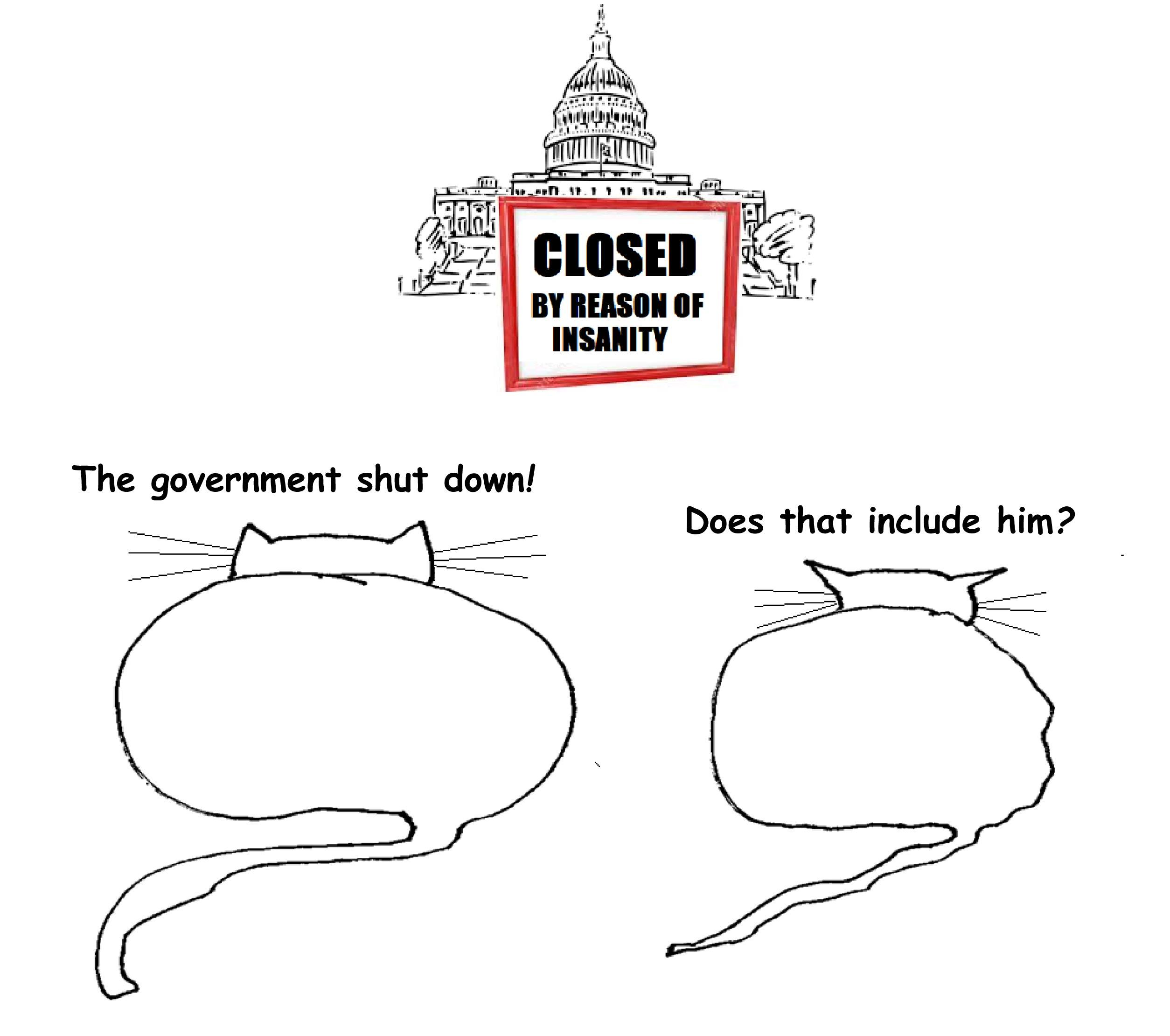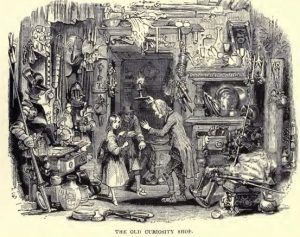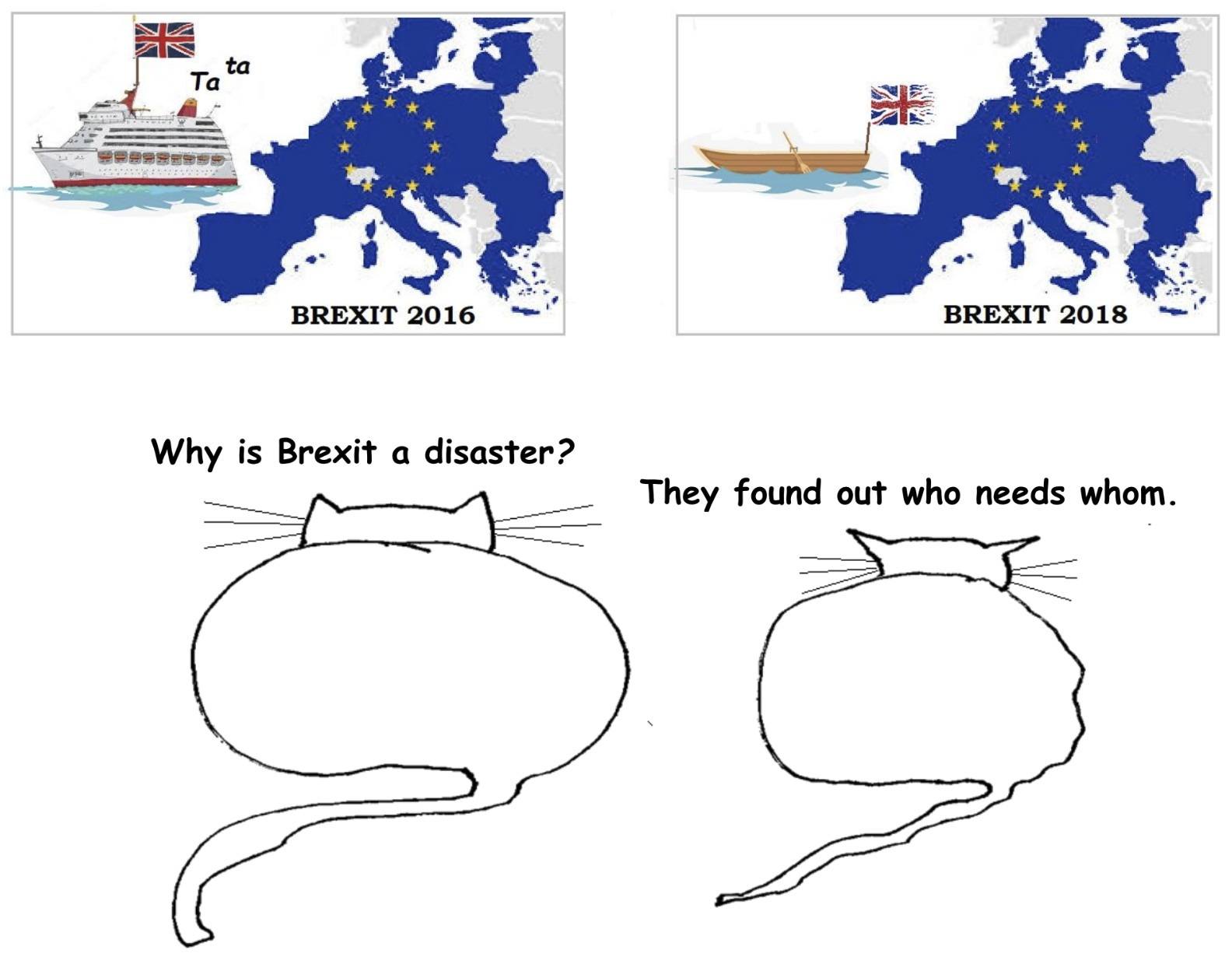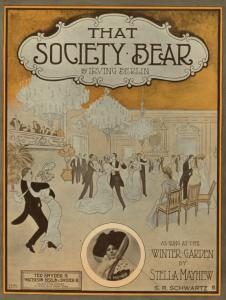by Brooks Riley

by Brooks Riley

by Max Sirak
 As we approach the end of the year, it’s that time again. Not to flip the page to the next month, but to buy a new calendar. (Who am I kidding? It’s probably only me and your grandmother who still uses paper wall calendars…) And also to reflect.
As we approach the end of the year, it’s that time again. Not to flip the page to the next month, but to buy a new calendar. (Who am I kidding? It’s probably only me and your grandmother who still uses paper wall calendars…) And also to reflect.
I learned a lot in 2018. I learned about how the genealogy of Batman can be traced to Alexander Dumas. I learned about the importance of taking ownership of our emotional reactions. But, by far, the most important thing I learned was the importance of not growing up.
Say What?
It’s not that I have anything against being an adult. Working, making money, buying stuff, and maybe owning the place you live are all fine and good, I guess. But after doing these things for a while, I realized I was feeling pretty empty inside.
These things, which mean so much to so many and most seem to organize their lives around, didn’t do it for me. They didn’t satisfy me. And the more I tried to fake it, the more I tried to buy in and force myself to care about these things that practically everyone else seemed to be completely absorbed in – the worse I felt.
Until one night, toward the beginning of September, when I stumbled back into joy. Read more »
by Christopher Bacas
 Guinea and Redhead were part of a large food chain. Beyond campus’ freshly-baked sidewalks, a Cowboy Mafia ferried contraband from the south. They landed small prop planes on ranch land outside of town, cut powder with dental anesthetics and broke up the bales. Their wares clumped on our cafeteria trays and glinted in tiny screw-top bottles. The capo, a local big-hat business man,who ran a palatial kicker-dance hall and owned the ranch. That legit business and his crew’s discipline kept them out of jail. Maybe a hat full of cash in the bargain.
Guinea and Redhead were part of a large food chain. Beyond campus’ freshly-baked sidewalks, a Cowboy Mafia ferried contraband from the south. They landed small prop planes on ranch land outside of town, cut powder with dental anesthetics and broke up the bales. Their wares clumped on our cafeteria trays and glinted in tiny screw-top bottles. The capo, a local big-hat business man,who ran a palatial kicker-dance hall and owned the ranch. That legit business and his crew’s discipline kept them out of jail. Maybe a hat full of cash in the bargain.
My Trumpet buddy shared an apartment in a low-rise student complex. Trumpet’s Roomie was in with the Cowboys. I found out when I made a visit. From outside, the shitty drywall construction leaked sound and odors like a window screen. Inside, eucalyptus gas wrapped around my head. I knew Roomie a little. He didn’t seem to remember. Wide-eyed, fidgeting, he appraised me.
“You cool?”
I reckoned I was. In his bedroom, he kicked aside some laundry and slid open a door. On the floor, a bulging black Hefty bag yawned. Inside, Tolkein magic: lichen grown thigh-deep, whispering in shadow. Despite mind-expanding potential, there was no joy in babysitting a large ingot of fools’ gold. Read more »
by Emrys Westacott
 Philosophers are supposed to ask Big Questions. The Big Questions is the title of a popular introduction to philosophy and of a long-running BBC programme in which people discuss their ethical and religious perspectives. But since we philosophers, following in the footsteps of Socrates, claim to practice critical thinking, it behooves us to ask whether Big Questions are a good idea.
Philosophers are supposed to ask Big Questions. The Big Questions is the title of a popular introduction to philosophy and of a long-running BBC programme in which people discuss their ethical and religious perspectives. But since we philosophers, following in the footsteps of Socrates, claim to practice critical thinking, it behooves us to ask whether Big Questions are a good idea.
It’s not easy to say precisely what makes a question big; but we can at least give a few examples form the history of philosophy so that we have some idea what we’re talking about:
In modern times such questions have met with various fates. The cultural ascendancy of natural science was accompanied by skepticism toward what Kant calls “speculative metaphysics.” Simply put, we can’t have knowledge of matters that lie beyond what we can possibly experience. So we can’t know if there is a god, or if we have immortal souls, or if there is cosmic justice. In his Critique of Pure Reason (1781) Kant claimed that in denying knowledge he was “making room for faith.” Inevitably, though, faith in God, the soul and the afterlife has declined dramatically since Kant’s time, especially among intellectuals. There are virtually no articles published in philosophy journals today that treat the existence of God or the immortality of the soul as live issues. Science does not explicitly teach us that there is no God and no heaven, any more than it teaches us that there are no fairies or vampires. But the default attitude of most professional philosophers today is that in such matters the absence of evidence amounts to evidence of absence. Read more »
In his Critique of Pure Reason (1781) Kant claimed that in denying knowledge he was “making room for faith.” Inevitably, though, faith in God, the soul and the afterlife has declined dramatically since Kant’s time, especially among intellectuals. There are virtually no articles published in philosophy journals today that treat the existence of God or the immortality of the soul as live issues. Science does not explicitly teach us that there is no God and no heaven, any more than it teaches us that there are no fairies or vampires. But the default attitude of most professional philosophers today is that in such matters the absence of evidence amounts to evidence of absence. Read more »
by Shawn Crawford

In January of 1841, passengers arriving from Europe would be greeted by anxious New Yorkers on the docks. They all had the same question: “Is Little Nell dead?” Such was the anxiety caused by Charles Dickens’ novel The Old Curiosity Shop. But why couldn’t tortured New Yorkers simply read to the end of the book and relieve their fears?
Dickens’ work, like many Victorian novels, originally saw publication in serial form. Released monthly in periodicals or stand-alone as “part issues”, normally in three to five chapter installments, serial novels kept the public guessing and agonizing for up to two years. From the serial we derive the term “cliffhanger,” coined for the fraught dilemmas characters found themselves in at the end of an installment. In the case of serial master Wilkie Collins, often literally hanging from a cliff or heading over a waterfall. Spoiler alert: Little Nell dies. Readers in London and New York wept on the streets as they finished the installment describing her fate.
While a brilliant economic strategy, after serialization you could sell the book, the serial novel also offered the perfect form to entrance Victorian audiences. As Linda K. Hughes and Michael Lund point out in The Victorian Serial, personal development became an obsession in the Victorian mind. Serial novels mirrored their belief that personal and cultural progress was gradual, positive, and inevitable. Read more »
by Abigail Akavia

Tuesday, December 4th, was a day of widespread women’s protests against gender-based violence in Israel. A general women’s strike was declared, which garnered the support of governmental departments, municipalities, unions and major corporations. Demonstrations were held across the country: roads were blocked; water in public fountains was dyed red; at Habima Square in Tel Aviv, an installation of red shoes inspired by the work of Mexican artist Elina Chauvet commemorated victims of domestic violence. The principal event was a mass rally in Tel Aviv Rabin’s Square. The vigils, protests, and marches, organized by dozens of feminist groups led by the Red Flag Coalition, gained an all-encompassing female empowerment vibe à la worldwide women’s marches, pussy riots, and the MeToo movement. The demonstrations were aimed specifically against the government’s with regard to the prevention of domestic violence, and its neglect to finance a multi-departmental program to address the issue—a program it had already principally approved a year ago.
A mere week afterwards, an honorary prize for “contribution to Israeli song” was given at the Knesset, the seat of Israeli parliament, to Eyal Golan. Golan, an immensely popular singer and performer, was investigated four years ago for (allegedly) repeatedly prostituting minor girls, with the help of his father. The criminal case against both of them was closed for “lack of evidence.” Golan was not the sole recipient of the prize, but his presence at the Knesset was controversial and sparked a protest of its own. (Some of the other prize recipients chose to absent themselves.) Though the prize and the ceremony were the initiative of one Knesset member and not an official event of the parliament, the Knesset Chairman is authorized to prevent such a ceremony from taking place. The fact that he didn’t, and that the Knesset as an institution—if not officially then at least by proxy—celebrated a man who casually abused girls, sends a perverted, corrupt message to Israeli women and the public at large. It proves the necessity of women’s disruptive activism in Israel today and, at once, its limited pragmatic effect so far. Read more »
by Joan Harvey

When the air becomes uraneous
We will all go simultaneous
Yes, we all will go together
When we all go together
Yes we all will go together when we go
—Tom Lehrer, “We Will All Go Together When We Go”
You know what uranium is, right? It’s this thing called nuclear weapons. And other things. Like lots of things are done with uranium. Including some bad things.
—Donald J. Trump
The tide has turned, the Democrats have the House, Mueller showers us with gifts each day, hope lurches upward, though past trauma urges us to perpetually rein it in. We’re glued to the news, good or bad, to a level of destruction, corruption, drama, and scandal so great, it’s impossible to keep up with even a small part of it. We can’t process it all; we can barely find effective ways to act besides logging in with the Resistance, enjoying clever tweets, and imbibing good quantities of gin.
It’s hard to argue with Yuval Harari that the three main threats to our existence are climate change, artificial intelligence (and with it biotechnology), and nuclear war. And yet for most of us, saving some shreds of democracy (and decency) come first. Climate change certainly is on our minds, in the news every day, present to us as we watch so many people and animals suffer and homes and habitats destroyed. Then there’s AI, newest of the threats, still kind of sci-fi and sexy, and because we all work with computers and also have watched Facebook turn into a monster, the dangers of AI also do not feel so distant. But, left behind, neglected, is the oldest of these three manmade megathreats to the world, the peril of nuclear war. It’s a danger that has not diminished over time and is in actuality increasing. But even though it has the potential to be the most immediately destructive, it can feel the most remote.
I’m one of the few people who grew up on a homesite with a bomb shelter, a dark cold cave dug into a hill on my parents’ property. There may still be canned goods in there from the ‘60s, for all I know. Read more »
by Joseph Shieber

1. One of the descriptions often used by proponents of the so-called Intellectual Dark Web (henceforth IDW) to describe the views of the supposed shibboleths they’re critiquing is “virtue-signaling”.
There are a few problems with the use of the term “virtue-signaling” as a critique. Indeed, a number of those problems have been observed by some who might otherwise agree with at least some of the positions espoused by IDW adherents (e.g., Sam Bowman here).
Here are three of those problems with the notion of “virtue-signaling”. The first is that the term is a misnomer — that it’s a misapplication of the notion of “signaling”. Call this the MISAPPLICATION argument. The second is that it unjustly implies that those to whom it’s applied are being intentionally disingenuous — or even dishonest. Call this the UNJUST argument. The third is that the propensity of IDW adherents to characterize the actions of those that they criticize as “virtue-signaling” is itself an instance of signaling, and criticizable on equivalent grounds. Call this the HYPOCRISY argument.
I appreciate all three of these arguments, but I want to raise a different issue with using the notion of “signaling” as a lens with which to analyze behavior.
In order to do that, though, it’ll be helpful to look at the MISAPPLICATION, UNJUST, and HYPOCRISY arguments in a bit more detail. And to do that, we need to look a bit more at the notion of signaling. Read more »
by Brooks Riley

by Samia Altaf
 Mandra health center, outside Islamabad, on this spring morning, without the cacophony and confusion of health centers in the city, was the picture of serenity. An emaciated woman of indeterminate age sits coughing in the corridor, in a chair that bears the logo of the United States Agency for International Development, next to a little girl with dry shoulder length hair and yellow eyes, one bare foot resting upon the other. I make a provisional diagnosis—pulmonary tuberculosis for the woman, viral hepatitis for the girl, both diseases endemic in Pakistan.
Mandra health center, outside Islamabad, on this spring morning, without the cacophony and confusion of health centers in the city, was the picture of serenity. An emaciated woman of indeterminate age sits coughing in the corridor, in a chair that bears the logo of the United States Agency for International Development, next to a little girl with dry shoulder length hair and yellow eyes, one bare foot resting upon the other. I make a provisional diagnosis—pulmonary tuberculosis for the woman, viral hepatitis for the girl, both diseases endemic in Pakistan.
In a room cluttered with furniture and people, its walls lined with the ubiquitous portrait of the Quaid-e-Azam, a map of district Gujjar Khan and a couple of framed certificates whose writing is mostly illegible except for the USAID logo, the Medical Officer is examining patients. He nods to me while still attached to his stethoscope the other end of which rests on the chest of a skinny young man sitting on a stool holding up his shirt to expose his protruding Christ-like ribs. A man and a woman stand waiting calmly for their turn on the stool.
Mandra center, part of the government’s health service system that caters to the medical needs of almost 75 percent of Pakistan’s population, is one of the 32 hospitals upgraded by USAID for a total of $92 million to improve emergency maternal neonatal and child health services under a project called PAIMAN (Pakistan Initiative for Mothers and Newborns). John Snow Inc. implemented it from 2005 to 2011.

USAID funded repairs, provided surgical equipment, trained staff, and built a vaccination room with refrigerator to store vaccines. It provided benches and white boards for the meeting room where visiting US CODELS (Congressional Delegations) and USAID officials were briefed about the project. Mrs. Munter, the US ambassador’s wife, “sat here” said the medical officer pointing to a chair. “That was such a good time,” he remarks as we walk around. “See this corridor,“ he says, pointing up and down, “renovated by USAID. The walls, the floor, the tiles , the furniture, these chairs. They also equipped the operating room for C-sections and other obstetrical surgeries.” He begins to count off the equipment on his fingers—“special operating table, shadow-less lights, sonogram, sterilizer…and a special vaccination room. Come I will show you.” Read more »
by Dwight Furrow
 From its origins in Eurasia some 8,000 years ago, wine has spread to become a staple at dinner tables throughout the world. Yet wine is more than just a beverage. People devote a lifetime to its study, spend fortunes tracking down rare bottles, and give up respectable, lucrative careers to spend their days on a tractor or hosing out barrels, while incurring the risk of making a product utterly dependent on the uncertainties of nature. For them, wine is an object of love.
From its origins in Eurasia some 8,000 years ago, wine has spread to become a staple at dinner tables throughout the world. Yet wine is more than just a beverage. People devote a lifetime to its study, spend fortunes tracking down rare bottles, and give up respectable, lucrative careers to spend their days on a tractor or hosing out barrels, while incurring the risk of making a product utterly dependent on the uncertainties of nature. For them, wine is an object of love.
But why is fermented grape juice worthy of such devotion? What is the secret of its allure? It’s not only because it tastes good or gets you drunk. Orange juice tastes good but it is seldom an object of love, and there are far more efficient and cheaper ways of getting drunk. My answer to this question is that wine, unique among beverages, displays some of the characteristics of a living organism. This “vitality” exhibited by wine in its production and appreciation has a distinctive aesthetic appeal that accounts for its capacity to draw people to its orbit. Of course wine is also pleasing to drink and a source of alcoholic cheer, both of which contribute to its aesthetic appeal. But it is wine’s vitality that makes it an object of devotion.
What reasons do we have for conceptualizing wine as a living organism? Read more »
by Thomas R. Wells
 Academics have a privileged epistemic position in society. They deserve to be listened to, their claims believed, and their recommendations considered seriously. What they say about their subject of expertise is more likely to be true than what anyone else has to say about it.
Academics have a privileged epistemic position in society. They deserve to be listened to, their claims believed, and their recommendations considered seriously. What they say about their subject of expertise is more likely to be true than what anyone else has to say about it.
Unfortunately, some academics believe they have a right – or even a duty – to use their privileged position to shape society in the right way. They join organisations and campaign systematically for specific laws, policies, and political candidates. They tell their students who to vote for and help them organise protest marches. They launch boycotts of companies and countries they disapprove of.
Such activism is an abuse of academics’ privileged status that undermines the respect that academic expertise should command and the functioning of academia itself.
I
Academics’ expertise derives from their membership of specialized epistemic communities (what I have elsewhere called ‘truth machines‘) that develop methods to investigate particular issues or features of how the world works, whether that be the effects of international migration on labour markets or the geo-physics of climate change. The outcome of this is not that academics are guaranteed to be correct (just look at the history of science). It is that they have access to the best understanding of the topic that those people in the world most dedicated and able to investigate it have yet managed to figure out. Read more »
by Michael Liss
 The day before Thanksgiving I got this wonderfully understated text from a close friend:
The day before Thanksgiving I got this wonderfully understated text from a close friend:
A ???? ate our ???? last night. (I forgot it on the patio while it was brining.)
There is a lot that’s packed in there. He followed it up with a picture of the now-overturned and empty brining vessel, and a quite stunning shot of bear tracks in the snow leading away from the patio. Unless a local who knew of his remarkable culinary skill with fowl decided to approach the house wearing bear-claw flip-flops (to throw him off the scent, as it were), there was definitely a visitation from a neighborhood ursus americanus.
Fortunately, he resides in a rather bucolic part of a rather bucolic college town, which enables him and his family to live a bucolic life…, but they have access to several Whole Foods, Trader Joe’s and similar establishments when these unexpected encounters occur. The turkey in question was, in absentia, bid a respectful adieu, and quickly and calmly replaced. My friend happens to be unflappable. I, on the other hand, am more urban, and have more flap about these kind of things, so I asked a follow-up question. As the brined bird and the bear claw were really close to the back door, was he prepared to exercise his 2nd Amendment rights, if hearth and home were threatened. I’ll leave the answer to that one to the imagination.
Wild game and guns, a perfect lead-in to the Midterms and the Whole Foods-Cracker Barrel Old Country Store split that pollsters identified. Cracker Barrel has exactly one location in each of Maine, Rhode Island, and New Hampshire, two in Connecticut, eight in Massachusetts (take that, Michael Dukakis), and none in Vermont. By contrast, it has 39 in West Virginia, with nary a Whole Foods in sight. In January (numbers from Dave Wasserman, the U.S. House Editor of the non-partisan Cook Political Report), House Democrats will represent 78% of Whole Foods communities and 27% of Cracker Barrel ones. Apparently, my people are better with organic duck breast pate than chicken-fried steak.
OK, I’ve had my fun, so let’s get down to the actual meal. There were a couple of bumps (like the Senate), but, on the whole, the Democrats did quite well in November—at current count, they flipped a net 40 Congressional Districts, 400+ State legislators, 7 Governors, and an assorted contingent of State Treasurers, Secretaries of State, Commissioners and other sub-luminaries. Read more »
by Robert Fay
Near the end of Italy’s greatest 20th century novel, The Leopard by Giuseppe di Lampedusa, the elderly Prince Salinas is slumped in an armchair on a Sicilian hotel balcony looking at Mounte Pelligrino. The Prince knows he’s dying, but even more poignantly, he understands centuries of Salinas aristocratic mores and traditions will soon die with him. It is 1881 and a unified, republican Italy has recently displaced the monarchial customs and feudal relationships of the Kingdom of the Two Sicilies. The Prince has witnessed the complete collapse of his world within two decades. And though he has an heir, his grandson Fabrizietto, the boy is “odious” and incapable of protecting the sacred Salinas patrimony. He is a product of this new, republican age, “with his good-time instincts, with his tendency to middle-class chic.”
Lampedusa’s narrator describes the Prince’s loss this way: “for the significance of a noble family lies entirely in its traditions, that is in its vital memories. And (the Prince) was the last to have any unusual memories, anything different from other families. Fabrizietto would have only banal ones like his schoolfellows, of snacks, of spiteful little jokes against teachers…”

Trying to elicit sympathy for elites is generally a fool’s errand, but Lampedusa is such a master, that any unprejudiced reader of The Leopard will surely be moved by the enormous humanity of the Prince. He is undoubtedly a snob, but his snobbery is like the egoism of a fighter pilot or the boastful pride of a mother, which is to say, it is in inseparable from their mission, their vocation. The power of this portrayal undoubtedly stems from the personal pain and loss in Lampedusa’s own life. He was born in 1896 to an aristocratic family and in 1943 his beloved family estate in Palermo—the seat of the Lampedusa family for centuries—was destroyed by U.S. Army Air Corps bombers during World War II. It was a loss that Lampedusa could never reconcile himself to. He had believed he’d die in that house, just as all ancestors had.
There is an echo of Lampadusa’s fate in the life of fellow aristocrat and novelist Vladimir Nabokov, who lost his ancestral estate(s) in Russia to war and politics. The Nabokovs had roots dating back to a 14th Century Tartar prince, but the cadres of the Bolshevik Revolution cut those ties in 1918, seizing the family’s properties and forcing them into exile. Nabokov never got over this loss. In a 1964 interview with Playboy he explained why he’d never bought a house in America, despite being a resident for 20 years, “…the background reason, is, I suppose, that nothing short of a replica of my childhood surroundings would have satisfied me. I would never manage to match my memories correctly—so why trouble with hopeless approximations?” Read more »
…… —for my mother, Mary Mraz Culleny,
……… b. December 8, 1917
.

a cathedral steeple’s being launched,
snow swirls around its nave
so much stone to be sent aloft
on the tiny spark of a solitary rose
so much weight to be thrust into something other
by the flame of a delicate rose
from cold to colder it ascends
by the blaze of a redhot dot of life
on a stem
from breath to unbreath it’ll rise
by the spit fire of a steadfast
solitary rose
.
Jim Culleny
12/09/18
Photograph by Abbas Raza
by Akim Reinhardt

What’s the ultimate fate of humanity? It’s hard to picture a scenario that ends well.
Some hungry plague could kill us all off, or at least kill enough of us to send the survivors groping backwards down the trail towards caveman life.
An asteroid or some other space debris could smash into the planet, eradicating all but the Earth’s smallest life forms. Roaches win in the end.
A black hole might swallow our sun. That just happened near the constellation Draco. Well, actually, it happened 3.9 billion years ago, but close enough for jazz. We could be next.
Space aliens. Can’t rule out an invasion by space aliens. That probably won’t go well.
However, the more mundane, but perhaps likelier, possibility is that we just kill ourselves. Read more »
by Leanne Ogasawara

I once lived in a town famous for plum blossoms.
To get there, you have to board an express train out of the busiest train station in the world. The view out the window won’t impress you all that much either; as Tokyo sprawls endlessly gray outward from the center. After about 30 minutes, you will notice the train crossing a bridge over a river (the unmistakable rhythmic sound will alert you even if you’ve closed your eyes). This is your cue to get ready to hop off at the next station; for there, on the western shore of the Tama River, you will need to change to a local train.
And from there, it is just one more stop.
Mogusaen. Its name means, “garden of a hundred grasses” (百草園). A sleepy little neighborhood not even large enough to merit an express stop on the Keio Line, Mogusaen would make the TV news every February, when something incredible happened. How to describe those fragile-looking plum flowers blooming defiantly in the snow? Especially at night, the pale flowers on frozen trees branches would shimmer in the moonlight. It was enchanting.
So splendid were the plum blossoms of Mogusean that blossom-viewers would travel from far and wide just to see them every year. In fact, such was the rush of people that the entire Keio Line train network would have to be reorganized to turn Mogusaen into an express stop for the several weeks when the plum trees were in bloom. During this brief period, huge crowds used to stream in on the express train to go plum blossom-viewing.
But all too soon, the flowers would fade– and Mogusaen reverted back to its ordinary incarnation of sleepy, little local stop again. Even now, I still can’t help but smile when I think of how those flowers commanded the complete rescheduling of one of Tokyo’s busiest train lines! Read more »
by Richard Passov
 Our uniform was a shirt tucked into jeans. Sandi stretched the smallest size over well-proportioned breasts, her black bra peeking through a run of buttons. Mine hung long in the sleeves and fell over my waist.
Our uniform was a shirt tucked into jeans. Sandi stretched the smallest size over well-proportioned breasts, her black bra peeking through a run of buttons. Mine hung long in the sleeves and fell over my waist.
I was trying to work my way through college in the kitchen of a teaching hospital on the campus where the ARPANET, precursor to the internet, was sending single word messages between the five nodes across the country capable of receiving messages. I was also trying to stay away from drugs. But when Sandi, in tight jeans, smiled over her shoulder, I chose to follow.
“You cool, right?” she asked.
We went through the seating area, out the front door, around to the right, into a curve in the architecture where some thoughtful gardener had planted the rose bushes that Sandi used as a shield. “Here,” she said, after taking a hit from a joint.
The dope tasted like street dirt I had undercut in South Central. A soft weight came over me. My host brought her palms together then shimmied to silent music.
When she stopped and looked past me, I turned to see a young black man with a small head wearing a ribbed wife beater over beady muscles. His colors, stuffed into a back pocket, crept around his leg.
“Hey Pea,” she said walking to him. “You know I like it when you come see me while I working.” Read more »